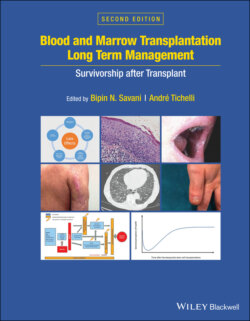Читать книгу Blood and Marrow Transplantation Long Term Management - Группа авторов - Страница 24
Future of Data Collection in Survivorship
ОглавлениеEfforts are being made to improve data collection for long‐term survivors. Growth of dedicated late effects‐focused clinics in both the pediatric and adult setting has the potential to improve patient engagement and decrease the number of patients lost to follow‐up in the years following HCT [16–20]. The utilization of technology, such as mobile health (mhealth) platforms to track the health of survivors, electronic patient‐reported outcomes, and streamlined registry data ascertainment using electronic health record systems, is being investigated as an alternative means of data collection that may not require patients to return to their specific transplant centers [21‐23]. Sharing research findings with patients and caregivers through various forums (i.e. online webinars, in‐person conferences) can demonstrate the importance of continued registry involvement and may result in improved patient follow‐up.
Registries are also adapting and expanding to include outcomes related to various novel cellular therapies, such as chimeric antigen receptor T‐cell (CART) therapy, in addition to HCT. Though only short‐term data are available for novel cellular therapies at this time, the importance of following these patients long‐term to evaluate for potential late effects has been acknowledged and is already being discussed. Facilitating the merging of other disease and treatment‐specific registries not centered on HCT alone (such as those focused on solid‐organ transplant, hematologic or solid‐tumor malignancy therapies, and pediatric or adult cancer survivors) is another area of interest [24]. Though merging data from diverse registries represents another opportunity to compare patient populations and use registry data to its full extent, challenges exist since data collection methodology is seldom standardized, and the collection of uniform, unique identifiers is inconsistent. Most importantly, continued and increased future collaborations between the major HCT registries presented herein will be critical to enhance research endeavors focused on the growing population of HCT survivors.
